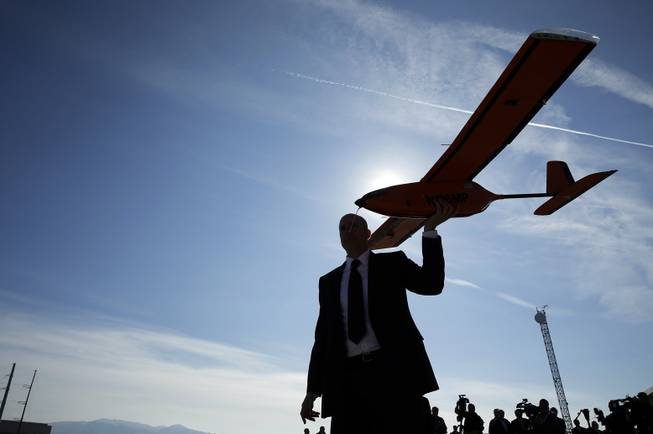
John Locher / AP
Dan Johnson of Sensurion Aerospace carries the Sensurion Aerospace Magpie commercial drone during an event Friday, Dec. 19, 2014, near Boulder City. The event was to announce the FAA’s first issuance of an unmanned aerial systems test site special airworthiness certificate.
Friday, Aug. 14, 2015 | 1:48 p.m.
It’s been more than a year since the Federal Aviation Administration designated the state of Nevada as a drone test site. Since then, the state has largely been quiet about what the sites are being used for.
One reason for the relative quiet: confidentiality agreements.
Much of the research going on at the test sites at about 35 locations across the state is proprietary, said Tom Wilczek, who works closely with the test sites as the aerospace industry specialist in the Governor’s Office of Economic Development.
“They are trying to get a competitive edge,” he said.
The state has signed non-disclosure agreements with various organizations that have made use of the sites. Those using the sites include private companies, universities and public agencies.
“The research is applications based,” Wilczek said. “How can the technology be used in the real-world environment?”
Those applications could include commercial drone use in engineering projects, drought mitigation, agriculture and wildfire mitigation.
With the designation as a test site last June, Nevada became one of six congressionally-mandated locations for research as the FAA develops rules for integration of commercial drones into national airspace. In its original application, the state designated four locations as sites: Fallon Municipal Airport, Nevada National Security Site/Desert Rock Airport, Reno-Stead Airport and Boulder City Municipal Airport. However, test site now include locations across the state, the majority of which are airstrips.
While universities and companies that work on the site are under no obligation to send their data back to the FAA, they do have the option to share their research data with the federal agency.
Over the next few months, the test site is expected to see a flurry of activity. Drone America, a Reno-based company that creates platforms for unmanned aerial vehicles, plans to start using the test site in the fall.
“We have been gearing up to do work on the test site,” said Mike Richards, its CEO.
In addition to UNR and the Desert Research Institute, UNLV has also conducted research at the test sites. University officials said UNLV engineers have investigated drone battery life as well as chartering a flying orchestra drone to provide live aerial entertainment.
UNR plans to use a test site in Northern Nevada, looking at aerodynamics. Warren Rapp, business development director for UNR’s Nevada Advanced Autonomous Systems Innovation Center, said there are several research areas unique to drones that are worth further research, including flight controls, the responsiveness and flight range.

Join the Discussion:
Check this out for a full explanation of our conversion to the LiveFyre commenting system and instructions on how to sign up for an account.
Full comments policy